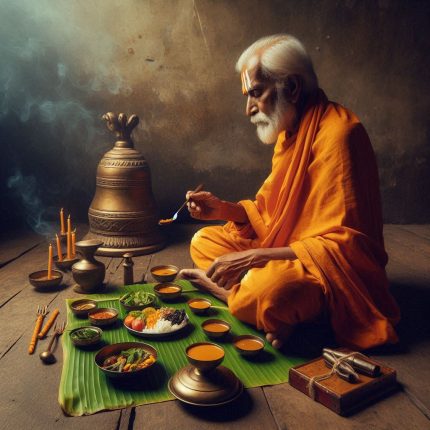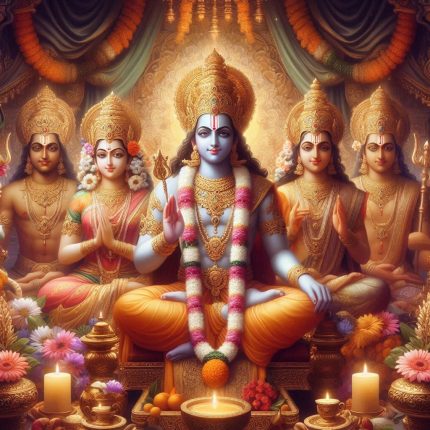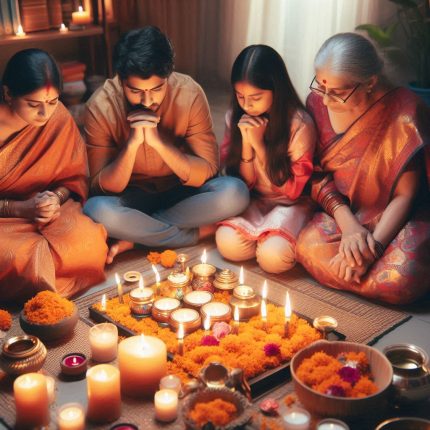Pind Daan Puja: Offering of Sacred Rice Balls for Peace and Liberation
Samagri
for Puja:
Haldi [organic] (20gm), Kumkum [organic] (20gm), Tulsi Mala (1), Diya Batti (5), Beetle Nuts (5), Desi Ghee (20ml), Honey (20ml), Jaggery (Gudh) (20gm), Akshata [Yellow rice] (20gm), Yagno-paveetha (5), Karpoora [camphor] (5Tabs), Red/White/Yellow Cloth(1 mtr), Prasad [Laung, Elaichi, Mishri] (20gm), Mouli (25mtr), Ganga Jal (15ml), Durva [fresh] (1), Agarbatti (6)/Dhoop (2), Dakshina (100INR), God Idols (pair), Sambrani (2), Sambrani Holder (1), Kalash [small copper] (1), Panchpatra [small copper] (1), Diya Holder (2), Panchamrit spoon (1), Karpoora Holder(1), includes perishables [Beetle Leaves [fresh] (9), Flowers [fresh] (incl mala), Tulsi [fresh], Mango Leaves [fresh] (7)]
Small Havan:
Cow Dung Cake (2), Mango Wood (250gm), HavanSamagri [20+ Grganic Herbs] (100gm), Ghee (20ml)
Yajman to provide:
Curd (100gm), Milk (100ml), Mithai (250gm), Fruits [5types], Coconut (1), HavanKund, SuchiSarva (Havan Spoon) (1), Kalash [big] (1), Bowl [preferably copper/silver] (1), Spoon [preferably copper/silver] (1), Utensils [2 big Plates (for Aarti/Samagri), disposable Plates, Bowls & Spoons], First solid food (preferably Kheer or Payasam)
Introduction
The Pind Daan Puja is a deeply significant ritual in Hindu death ceremonies that involves the offering of rice balls (pind) to deceased ancestors and departed souls. This ancient rite is performed to ensure peace and liberation for the souls of the departed, and to address unresolved issues or doshas (flaws) that may impact the living family members. The ritual is believed to provide nourishment to the spirits and aid in their journey to the afterlife.
Importance and Significance of Pind Daan Puja
The Pind Daan Puja holds profound spiritual and cultural significance:
- Nourishment for Departed Souls: The offering of pind (rice balls) is intended to provide nourishment and sustenance to the souls of the departed, helping them achieve peace and liberation.
- Resolution of Ancestral Issues: The ritual addresses any unresolved ancestral issues or doshas that may affect the family. It is believed to resolve spiritual debts and bring harmony to the family lineage.
- Cultural Tradition: The Pind Daan Puja is a key component of Hindu death rituals, upholding cultural traditions and reflecting the importance of honouring ancestors.
- Spiritual Cleansing: The ritual helps in purifying the family and their ancestral lineage, promoting spiritual well-being and balance.
Benefits of Pind Daan Puja
Participating in the Pind Daan Puja offers several benefits:
- Peace and Liberation: The puja aids in providing peace and liberation for the departed souls, ensuring their smooth transition to the afterlife.
- Resolution of Doshas: Performing the ritual helps in resolving any spiritual flaws or doshas affecting the family, promoting harmony and well-being.
- Cultural Continuity: Engaging in this traditional practice preserves cultural heritage and maintains a connection to ancestral customs.
- Spiritual Purification: The ritual cleanses the family lineage of negative influences, restoring spiritual balance and positive energy.
Occasions to Perform Pind Daan Puja
The Pind Daan Puja can be performed on various occasions:
- Post-Death Rituals: The puja is often conducted shortly after the death of a loved one, as part of the broader set of death rituals. It helps in addressing any unresolved spiritual matters related to the deceased.
- Pitru Paksha: The ritual is commonly performed during Pitru Paksha, a 15-day period dedicated to honoring ancestors and performing rites for deceased family members.
- Death Anniversary: The Pind Daan Puja can also be performed on the death anniversary of the departed soul as a mark of continued respect and remembrance.
- Significant Dates: The ritual may be scheduled on other significant dates or during particular family events to maintain spiritual well-being and honour ancestors.
Pind Daan Puja Vidhi (Procedure)
The Pind Daan Puja involves several ceremonial steps, each contributing to the ritual’s sanctity:
- Preparation: The family prepares for the puja by setting up a sacred space, including an altar with images or idols of deities and ancestors. Rice, sesame seeds, and other sacred items are prepared for the offering.
- Invocation of Deities: The ceremony begins with the invocation of deities and ancestors. The family offers prayers and seeks blessings for the departed souls and the family.
- Preparation of Pind: The rice balls (pind) are prepared using a mixture of rice, sesame seeds, and ghee (clarified butter). These rice balls symbolize nourishment and are offered to the departed souls.
- Offering of Pind: The pind are offered to the sacred fire (havan kund) or placed in a river or sacred water body, depending on the tradition. The offering is made while reciting mantras and prayers dedicated to the departed souls.
- Recitation of Mantras and Prayers: The priest recites specific mantras and prayers during the ritual, seeking divine blessings and resolution of any ancestral issues.
- Charitable Acts: Families may also perform charitable acts or make donations in the name of the departed souls as part of the ritual, reflecting the spirit of giving and compassion.
- Aarti and Conclusion: The ritual concludes with aarti (a ritual of offering light) to the deities and ancestors. Family members may also express their personal prayers and thoughts for the departed souls.
Pind Daan Puja Shubh Muhurat
The Shubh Muhurat (auspicious time) for performing the Pind Daan Puja is typically determined based on traditional schedules and astrological considerations. Consulting with a priest or astrologer can help identify the most suitable time for the ritual, ensuring that it aligns with cultural and religious guidelines.
Conclusion
The Pind Daan Puja is a deeply meaningful ritual that plays a vital role in Hindu death ceremonies. By performing this sacred offering of rice balls, families honour their departed ancestors, seek their peace and liberation, and address any unresolved spiritual issues. The ritual not only reinforces cultural traditions but also provides a profound way to remember and respect those who have passed away, ensuring their spiritual journey is honoured and their memory cherished.







